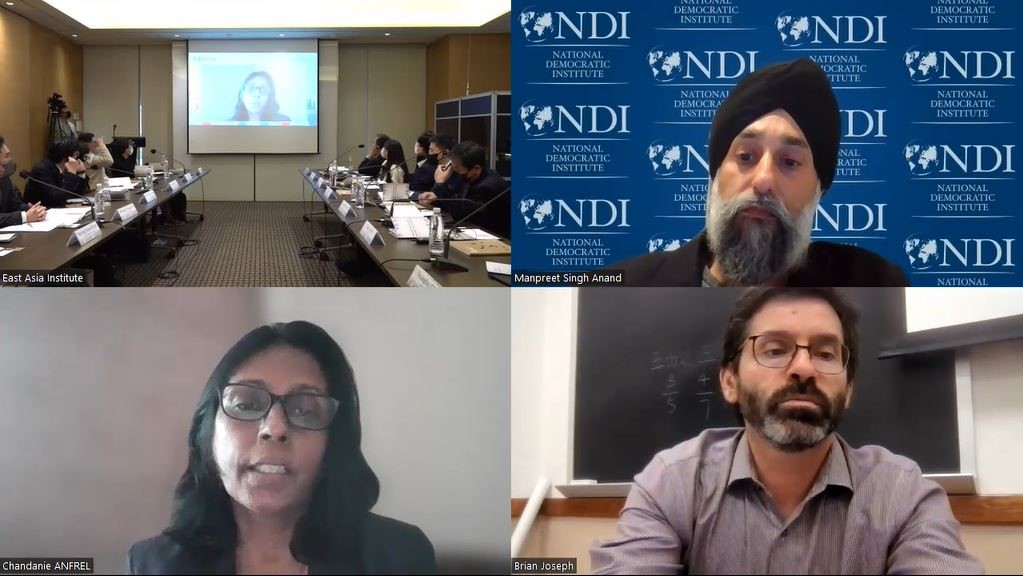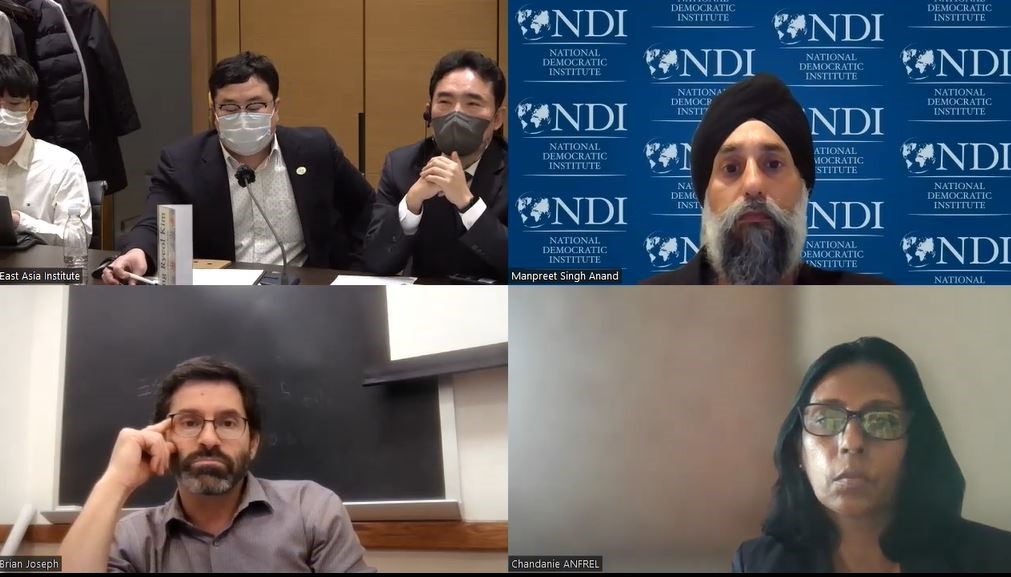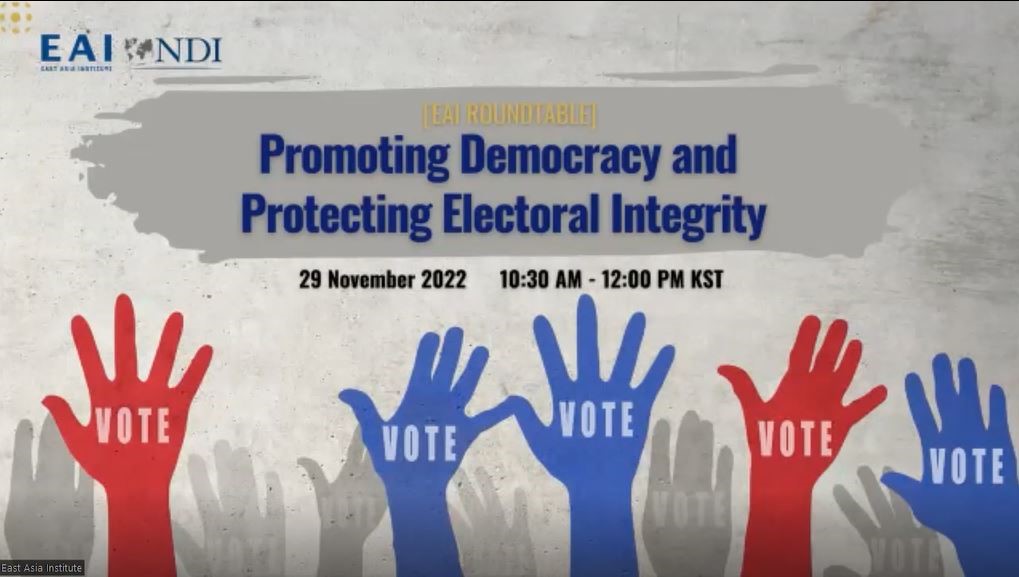![[EAI Roundtable] Promoting Democracy and Protecting Electoral Integrity](/data/bbs/eng_multimedia/20221212174739915004834.png)
The East Asia Institute held the first EAI-NDI roundtable, titled “Promoting Democracy and Protecting Electoral Integrity.” During the session, together with four Members of the National Assembly, six electoral experts, and three participants from the International Institute for Democracy, EAI discussed the prospects and challenges of the South Korean Government in supporting regional democracy.
• Date & Time: November 29, 2022 10:30 AM-12:00 PM (KST)
• Panelists: Manpreet Singh Anand (Regional Director for Asia-Pacific, National Democratic Institute), Brian Joseph (Vice President for Programs, National Endowment for Democracy), Chandanie Watawala (Executive Director, Asian Network for Free Elections
• Discussants: Junghun Cho (Transition Korea, Member of the 21st National Assembly), Youngho Cho (Associate Professor, Sogang University), Eun A Her People Power Party, Member of the 21st National Assembly), SukJae Hur (Researcher, National Assembly Research Service), Se Yeon Kim (Former Member of the National Assembly), Seung Ryeol Kim (Advisor to Secretary General, Association of World Election Bodies), Young-bae Kim (Democratic Party, Member of the 21st National Assembly), Woong Young Lee (Secretariat, Yeonsu-gu, Incheon-si Election Commission), Seon-young Min (Coordinator, Center for Legislative Watch, People’s Solidarity for Participatory Democracy)
• Moderator: Woochang Kang (Professor, Korea University), Sook Jong Lee (Professor, Sungkyunkwan University; Senior Fellow, East Asia Institute)
I. Strategy and Structure of Major Donor: National Endowment for Democracy
(1) Origins and Funding Structure of National Endowment for Democracy
The National Endowment for Democracy (NED) was created in 1984 as a private, non-profit organization, governed by an independent board of directors, but fully funded by the U.S. Congress, and the taxpayers. Behind the creation of NED was the United States’ strong interest and commitment to develop democracy and human rights around the world. The U.S. government wanted to find a way to separate the agenda of democracy from other foreign policy goals. The NED is composed of the NED itself, a grant-making organization, and supported by National Democratic Institute (NDI), International Republican Institute (IRI), and American Center for International Labor Solidarity (AFL-CIO). NED maintains its own political independence measure through its commitment to a singular mission of democratization, regardless of the political inclinations of the administration. NED does not lobby Congress, but rather seeks to engage Congress to promote discussions on democracy. Half of NED’s funding supports institutes working on technical programmatic work, while the other half goes to local non-governmental organizations dealing with a wide range of issues, including the development of democracy and human rights for minorities, women, youth, religious minorities, ethnic minorities, linguistic minorities, and independent media.
(2) Roles of U.S. Government Institutions in Supporting Democracy and Governance Efforts
The NED operates first and foremost with authorization by the U.S. Congress, which allocates congressional funding from the U.S. taxpayers. The budget includes funds for economic development, public health, food security, and the promotion of democracy and governance. The entire process is subject to congressional oversight, directed by congressional members and committees, in particular, the foreign affairs committee. Congress also allocates funds to the various U.S. government agencies with the goal of supporting democracy abroad and plays an important role in overseeing the programs carried out by the administration. The U.S. congress enjoys power not just over setting the policy framework, but also over allocating how much money will go towards implementing those policies.
The U.S. Department of State, much like regional bureaus, embassies, and the ambassadors on the ground, is at the forefront of the diplomatic engagement. In addition, with the bureau’s focus on democracy, governance, and labor rights, it is tasked with allocating huge sums of money to provide to various organizations to actually implement these policies. The United States Agency for International Development (USAID) is an independent agency within the U.S. government, and it works not just to develop policies for assistance but to directly support international and local organizations to implement programs around the world.
II. Technical and Financial Field Support: National Democracy Institute
(1) NDI’S Work on Functional Areas of Focus and Types of Assistance
NDI works with various sets of donors to implement grants. These grants range from political party development to legislative reinforcement, anti-corruption efforts, the inclusion of gender, youth, and other marginalized groups, information integrity, and election observation. NDI has more than 50 offices around the world, including one in Seoul. NDI works by utilizing a close-knit partnerships in local or regional implementation organizations. The categories of assistance fall into two main categories. The first is a sub-grant for local or regional organizations, in which t/he NDI provides minimal assistance through local or regional organizations. Secondly, NDI provides technical assistance in a variety of areas, including strategic communications, advocacy work, constituent outreach, and more.
(2) ROK and Democracy Assistance
Democracy and governance should be integrated as a part of national security strategy, development agenda, and national commitments. These values should not be promoted alone, but rather should be an underpinning principle for national priority objectives. With an abundance of programs aimed at the promotion of democracy, South Korea should expose itself to these opportunities and develop a better understanding of how to carry them out. South Korea could also provide assistance to pro-democracy activities which have been under attack, especially in the Asia-Pacific region. Based on traditional Korean development assistance programs, future projects could either work in coordination or be separately expanded to tackle broad democratic and governance goals.
Ⅲ. Activities of Regional Beneficiary: Asian Network for Free Elections
(1) ROK Brief Introduction to ANFREL’s Background and Work
The backsliding of democracy or democratic recession has been affecting democracy and the electoral processes in Asia. Many Asian countries have no periodic elections, as authoritarian regimes maintain their grip by imposing repressive laws, demolishing political opposition, civil society, free media, weakening institutions, etc. The Asian Network for Free Elections (ANFREL) has been working tirelessly to advance the cause of electoral democracy for more than twenty-five years. ANFREL was formed by a solidarity movement against authoritarian and doctoral regimes in multiple countries across the region. It continues to promote democracy by striving for free and fair elections.
ANFREL makes efforts to advocate for democratic governments in many ways, in particular election observations, strengthening and cooperating with electoral stakeholders, including domestic observer groups, and advocating and campaigning against the democratic recession in Asia.
(2) NED and NDI’s Support for ANFREL to Enhance Democracy in Asia
NED has been dedicated for many years to the growth and strengthening of democratic institutions around the world, and for many years has been a dedicated supporter by providing core funding and specific program funding for ANFREL. Another US organization that closely works with ANFREL is NDI, as it coordinates its tasks with domestic observer groups and the Global Network of Domestic Election Monitors to strengthen efforts through various programs and capacity building.
One of ANFREL’s main activities is international observations of elections held in Asian countries. ANFREL supports many organizations in Asia, particularly through the development of citizen observer groups that strive to promote free and fair elections.
(3) Recommendations for the South Korean Government for Supporting Regional Democracy
The South Korean government is a exemplary example of the region, as it is one of the most democratic countries and advanced economies in Asia. It is also recommended that the South Korean government learn from the lessons of the United States model in supporting human rights and democracy in other countries. Local and regional Civil Society Organizations in Asia would be largely benefited if Korea could support their work.
Ⅵ. Q&A and Discussion Session
(1)Regional Cooperation on Democratization
■ Se Yeon Kim (Former Member of the National Assembly)
Se Yeon Kim mentions that South Korea should raise awareness about promoting and expanding democracy, and highlights the need to cooperate with other nations and organizations to achieve this. In the situation that efforts to promote universal values such as democracy and human rights can clash with certain aspects of national interests, Se Yeon Kim wonders what are some systematic methods to overcome the resistance when reaching out to the citizens or cooperating with local organizations.
■ Young Bae Kim (Democratic Party, Member of the National Assembly)
Young Bae Kim says that it remains imperative to share and promote values such as democracy, freedom, and human rights with neighboring countries and citizens.
As one of the only divided countries in the world, South Korea is facing some limitations in sharing unique experiences with other countries within the Asia-pacific region. Meanwhile, he states that Korea can still uniquely contribute to Northeast Asia, and more broadly Asia, by expanding freedom and human rights on the civil level and promoting discussion on sustainability, climate change, human rights, and freedom with other Asia nations. He suggests that it’ll be better for the government to support local governments and grassroots movements to engage actively with their counterparts in other Asian countries. As the United States has been taking active measures to push forward democracy by changing political systems and pressuring authoritarian governments, he hopes that the Korean National Assembly to step up and form institutions and organizations which will take an active role in promoting exchanges within East Asia or other neighboring countries.
He points out that the Korea National Assembly is not promoting political exchanges on its own. As its activities have been isolated and sporadic, he hopes that Korean National Assembly could be the main actor in promoting democracy in Korea.
■ Manpreet Singh Anand (Regional Director for Asia Pacific, National Democratic Institute)
Manpreet Singh Anand claims that support for democracy is not just about government to government, but should be the whole society's assistance through civil society organizations, independent media, legislatures, marginalized groups, and more.
He welcomes the idea of the National Assembly taking a lead in exchanging views with other legislative bodies around Asia, and explains the U.S. Congress-led House Democracy Partnership in which members of congress engage with counterparts in various parts of the world. Just like this, he suggests South Korea do a peer-to-peer exchange by sharing how South Korea has gone through its own democratic development.
Although democratic institutions are being threatened and attacked, the demand for democracy has not diminished. Even today, people in mainland China are holding up blank pieces of paper to protest, and the Burmese haven’t diminished their desire for a democratic state even after the tremendous conflict. He emphasizes the need to distinguish between institutions being attacked versus the vibrancy of democracy itself, where can be a lot of cross-learning across the region.
(2) The Process of Democratization
■ Junghun Cho (Transition Korea, Member of the National Assembly)
Junghun Cho worked in the World Bank for over 10 years, helped countries like Nigeria go through democratic transitions, and operated programs on democracy in India and Bangladesh. He says that whenever he talked extensively about democracy, some people asked why he was so obsessed with it. He mentions that he contemplates a lot about promoting democracy because he believes Korea’s democratic system is imperfect, and none of the democratic systems across the world are perfect. He highlights that democracy is an ongoing process rather than a destination. To check whether well-established democratic principles hold up, he suggests it’ll be great to have time to talk with lawmakers from the U.S., Western Europe, and Asian countries.
■ Brian Joseph (Vice President for Programs, National Endowment for Democracy)
Brian Joseph demonstrates that although the two parties in the U.S. are nearly impossible to cooperate with all sorts of profoundly important domestic issues, the support for democracy assistance remains one of the few bipartisan areas of cooperation. He emphasizes that there’s a broad-based consensus on the value and importance of democracy for the United States.
Brian Joseph highlights that although South Korea is not a perfect democracy, that’s no different than any other country in the world. He says it gives credibility, presence, and makes South Korea such a phenomenal partner. He mentions that all of the countries are going through perpetual democratization.
■ Chandanie Watawala (Executive Director, Asian Network for Free Elections)
People who are struggling for a democratic government are already being prosecuted or exiled to other countries. Chandanie states that Korea should take the lead to support cooperation for civil society engagement while authoritarian governments as China and Russia are supporting other authoritarian. She suggests South Korean legislators to initiate a discussion with like-minded groups to support and corporate to enhance democracy around the regions.
■ Manpreet Singh Anand (Regional Director for Asia-Pacific, National Democratic Institute)
Manpreet Singh Anand stresses the power of the Korea and its own democratic development. He notes that there’s a role for Korea to play in democracy assistance, leveraging all of the cultural investment that has been made around the world and in Asia in particular.
(3) Suggestions to Protect Electoral Integrity
■ Seung Ryeol Kim (Advisor to Secretary General, Association of World Election Bodies; A-WEB)
Seung Ryeol Kim mentions the difficulties of non-governmental international organizations to receive assistance under the current Korean law. He explains that A-WEB is currently operating with 119 member organizations with only 500 million to 1 billion won per year. As democracy can work when electoral democracy properly functions, he states that it would be greatly appreciated if the Korean government contributes more to the association to promote and support electoral democracy.
■ Woong Yong Lee (Secretariat, National Election Commission in Yeonsu District)
Although Korea has various information and data, many are having difficulties in promoting the project due to the lack of money. The budget needs to be allocated, but there are no detailed budget application guidelines. Woong Yong Lee advises that a guidebook should be created that describes a process from start to complete using a series of step-by-step instructions.
He emphasizes that electoral support projects should be a long-term project, targeting a specific country for at least a decade.
■ Seon-young Min (Coordinator, Center for Legislative Watch, People's Solidarity for Participatory Democracy)
Seon-young Min raises the concern that the democratic values may be forcefully injected into countries just because they are a little behind in the level of democracy, similar to how economic systems were imposed on developing countries.
People’s Solidarity for Participatory Democracy has been working on promoting people’s participation in government decision-making processes and socio-economic reforms, by closely monitoring the abuse of power of the state and corporations to enhance transparency and accountability. She states that it would be better to create a platform managed by local governments to evaluate the implementation of election pledges, similar to what the Korea Manifesto Center is doing. She highlights that this will allow citizens to directly evaluate and talk about elections, candidates, or political parties.
■ Sukjae Hur (Researcher, National Assembly Research Service)
Sukjae Hur views that it seems more appropriate if the National Assembly takes a larger role in promoting universal values such as democracy, freedom, and human rights. As the NED funds are evenly distributed to the NDI as well as its Republican counterpart, he compliments the system of governance and suggest South Korea to adopt a similar system to this as well.
Regarding the polarization in today’s congress, he raises a question of how different organizations from different background cooperate under the same mission to promote democracy. ■



6대 프로젝트
Center for Democracy Cooperation
세부사업
South Korea Democracy Storytelling
![[ROK-Japan-Australia Trilateral Conference] ROK-Japan-Australia Cooperation in Trump 2.0](/data/bbs/eng_multimedia/2025040215755609143743(0).png)